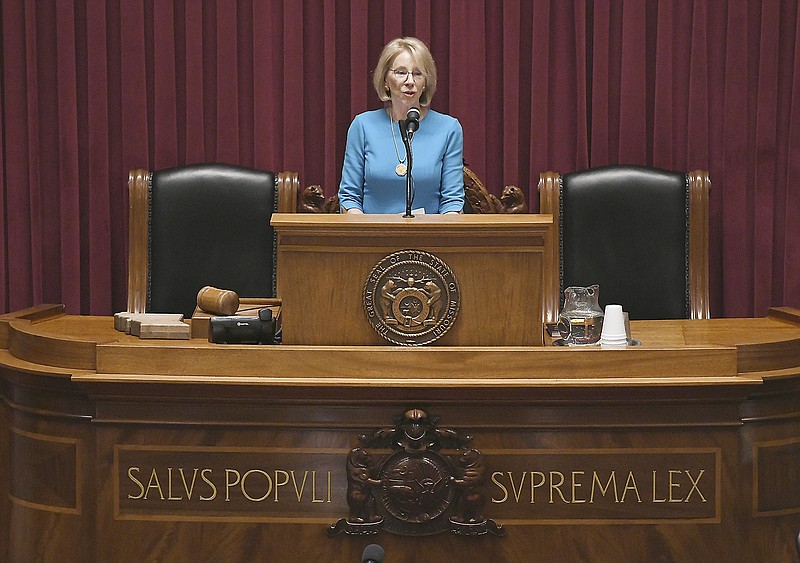The federal education department under the administration of President Donald Trump wants to do away with laws, such as Missouri's, that limit students' religious and education freedoms, U.S. Secretary of Education Betsy DeVos said Monday in Jefferson City.
"We are especially eager for the Supreme Court to put an end to the last acceptable prejudice, made manifest in bigoted Blaine Amendments, which deny students the freedom to pursue faith-based education," DeVos said.
"Students of all ages need the freedom to learn in ways and in places that align with their talents, their interests and their values," she added.
DeVos was the keynote speaker at the Federalist Society's annual Missouri Chapters Conference at the Missouri state Capitol.
Gov. Mike Parson, Missouri Secretary of State Jay Ashcroft and Missouri Attorney General Eric Schmitt also gave remarks at the conference, held in the House chamber.
The Federalist Society is an organization of lawyers, law students, scholars and others who sponsor a view of limited government - especially when it comes to the judiciary, by which the group enshrines the idea that courts' role is to clarify what law says, not decide what law ought to say.
The Blaine Amendments that DeVos referred to are laws prohibiting states from funding religious schools. In Missouri law, that's Article 1, Section 7 of the state's Constitution. The collective name of such laws that more than three dozen states have adopted refer to Congressman James Blaine, who in 1875 proposed such an amendment - that ultimately failed - to the U.S. Constitution.
The First Amendment of the U.S. Constitution only prohibits Congress from making "no law respecting the establishment of religion, or prohibiting the free exercise thereof."
"The First Amendment affirms our free exercise of religion, yet too many misinterpret a separation of church and state as an invitation to separate the people from their faith. In reality, the First Amendment protects our freedom of religion, not freedom from religion," DeVos said Monday.
The U.S. Supreme Court last week heard a case from Montana that could lead to a ruling that "no aid" clauses violate religious freedom, the Associated Press reported. More specifically in the Montana case, the legal question is whether parents' religious freedom was violated when they were barred from accessing a scholarship program for private K-12 education because the program was struck down by that state's Supreme Court.
DeVos had little, if any, confidence in the federal government's ability and role in providing education. She said the federal government's efforts to overhaul public education have failed, the country's education department has harmfully overextended its authority, and the Trump administration would continue to cut back the department's role and give power to state and local authorities, and families.
The Missouri Chapters Conference also served as a way for attorneys to earn continuing legal education hours, and featured discussions about legal issues of implicit bias, Title IX and due process, and school choice.
In addition to school choice, DeVos also spoke about the Trump administration's stance on Title IX - the federal education anti-sex discrimination law that includes federally-funded schools' obligations to address sex-based harassment, including sexual assault.
The administration has proposed changes to the law that, among other things, aim to better protect the rights of the accused.
"Our proposed rule recognizes that we can continue to combat sexual misconduct, without abandoning due process. It provides a menu of things schools can do to help survivors heal from trauma, and continue their education. Some mischaracterize these reforms as tilting the scales of justice, but we believe they will simply balance them," DeVos said.
Parson administration talks judicial appointments, crime
The Parson administration on Monday shared thoughts on legal issues, including crime.
Parson said to the House chamber full of lawyers, judges and other legal experts that his priorities include a long-term goal of making "sure I get these appointments right, especially in your arena. The next governor, whoever the next governor will be, will probably appoint three or four Supreme Court judges, very easily, in their next term. That's something that doesn't happen very often, and what you need to be doing for that, whoever that is, is be prepared today for tomorrow, for those decisions."
Parson also spoke about the importance of fighting crime.
Addressing gun violence has become a legislative priority in the current state session, though lawmakers have different ideas of how, that generally can be divided into camps of harsher punishments for certain weapons-related crimes and laws that aim to restrict certain people's access to firearms, such as domestic abusers.
Parson said when people speak of high crime rates in Missouri, that often brings to mind the larger cities of St. Louis and Kansas City, but the issue really affects everyone in the state: "There's no way to say, 'OK, that's out of sight, out of mind.' There's no way to say, when people are incarcerated, 'out of sight, out of mind.'"
"If you have lawlessness, if you have a lack of order, if you have (high) violent crime rates, and people feel less secure, it certainly opens the door for more people to offer the suggestion, 'Well, maybe we should have more gun control. Maybe the Second Amendment should be curtailed.' So, it's really important for us to stand up for the rule of law, because it has implications across the board, not just with those prosecutions (of violent crimes), but I think the tenor of the conversations we have as a country, as a state, in our communities," Missouri Attorney General Eric Schmitt said.

